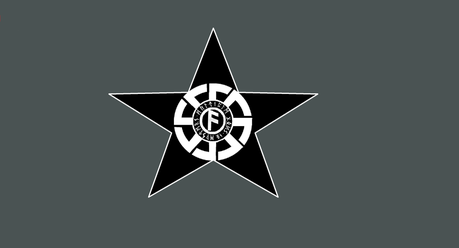
By Brenan Daniels
Below is a recent interview I had with Rhyd, the editor of the website Gods & Radicals, where we discuss the origins of the organization, paganism, and religion in anarchism.
1. What led to the creation and found of Gods and Radicals? How did the entire group get together?Gods & Radicals was started by myself and my friend Alley Valkyrie two years ago. We're both anarchists, the self-educated 'street-variety' as it were, living much of our lives working with homeless and other mostly-invisible victims of capitalism. And we also talked to other mostly-invisible things, like trees and dead people and land spirits and gods. So we were the self-educated street-variety of Pagans, too.For us, our anti-capitalism and our Paganism seem to flow into each other seamlessly. Our desire to protect the natural world and our desire to protect the vulnerable were both rooted in the same soil. And we knew lots of other Pagans who were also anarchists, and lots of other anarchists who were also Pagans, but noticed that few were ever talking about what seemed pretty self-evident to all us. Because of the overwhelming response we got after a presentation together at a Pagan conference in California, we realized there was massive desire to talk more about this. So we started the site, named it after the presentation we gave, and put out a call for writers, and we got flooded pretty quickly with offers to help. It was pretty amazing.2. Tell us about the journal A Beautiful Resistance. What led to its founding and what is the goal of the journal?Gods & Radicals is both a website and a non-profit publisher, and A Beautiful Resistance is one of our publications. The idea behind the name is pretty simple: we tend to forget what we're resisting for in the midst of all thing things we're resisting against. Resistance can be ugly, exhausting, full of sorrow and misery and pain. It can also be beautiful, and should be, because we're not just struggling against capitalism, against patriarchy, against racism, and against authority. Instead, we're resisting for something, for ideas and for people and for ways of being that are beautiful.Also, we wanted to challenge an unchallenged idea in both anarchist and Pagan publishing: we wanted to pay all our writers, to re-establish writing and art as labor that must be compensated. With A Beautiful Resistance and our other publications, we split all the revenue after costs 50% with all the contributors, with the other half going back into the organization to start new publishing projects. We've been pretty successful so far on this.3. How did you personally come to paganism and what exactly is paganism as it doesn't seem to be well understood in the general culture?I can't and won't define Paganism for everyone, but I'll happily tell you how I define it for myself.Paganism is the moment I lose my words at the sight of wildflowers breaking through sidewalk cracks in the poor areas of a city; the resurgence of the wild into the disciplined misery of the oppressed. It's the body that doesn't fit into the machine, the dream of buried rivers and streams under pavement. It's the tears I shed and the rage I feel when I see a river poisoned by an oil spill or see a mountain blown to bits to get at the coal underneath.For me, it's all about relation to not just the human-world but the other-than-human world. The mountain that gets blown apart so industrialized capitalism can grind on, the river that gets poisoned so people can have cars—I'm in relationship with them. Just like when a trans friend is harassed or a Muslim neighbor is terrorized, I cannot stand by and accept that violence, because we are related, we relate to each other, and our existence is all bound up together.I've always been like this, I think, but I didn't always identify the way I relate with the world as “Pagan.” Animism and witchcraft also describe it just as well. The words matter less to me than the worlds of meaning they attempt to describe.4. Many anarchists reject any religion, especially organized religion. How do you square your anarchist political beliefs with your paganism?I've always wanted to answer this question. More often than not, the question I am asked is how I square my pagan beliefs with generally atheistic anarchist political theory.First off, I—and Gods & Radicals—strongly rejects clericalism. Anyone who sets themselves up as a mediator between humans and the world is trying to control people. In fact, most of our political systems derive from earlier religious-authority forms, evolving from priestly-control of society to king- or politician-control with the advent of monotheism. What both secular Liberal Democracy and theocratic empires have in common is authority: that others (priests, kings, politicians, bosses) can and do have the authority to define the world for you. We reject that in all its forms.Traditionally, atheist anarchism and Marxism make the mistake of defining non-European, non-white, and indigenous spiritualities as 'superstitious' or even primitive. Post-colonialists like Dipesh Chakrabarty have helped unravel that as European exceptionalism, the continued notion that mostly-white leftists are somehow more superior in their atheist views because they've progressed past religion. They're enlightened, the rest of the world is not, and all that.So I see the insistence that leftists must always be atheists to be little more than that same European exceptionalism that led to colonial suppression of indigenous beliefs in the Americas and Africa. Re-embracing our own spiritual existences—and our ability to create new ways of being outside Capital and the state—is a key to our own liberation and also ongoing anti-colonialist efforts around the world. Otherwise, we're no different from the French in Haiti who tried to suppress indigenous African beliefs so the Blacks would make better slaves, or the Spanish and English who tried to wipe out First Nation's beliefs to 'civilize' them.To use an anarchist term, we're expropriating our meaning back, or in Marxist terms, we're seizing the means of the “production” of meaning.5. In what way does Gods and Radicals create and change the narrative surrounding paganism, as a religious belief, and anarchism as a political belief? What are the unique/new ideas or ways of thinking that G&R brings to the table?Our primary influence has thus far been within Paganism, and it's also where we get the majority of our critics. There are racist elements in American Paganism particularly that don't like us. Also, our anti-clerical stance has made us a few enemies with the plastic-shaman, media-hungry elements that see us as a threat to their greed. And we've helped expose a few charlatans and leaders sympathetic to fascism and the alt-right. So, lots of enemies, but even more friends: we get emails weekly from people who thought they were maybe the only Pagan anarchists around. I like those emails a lot.
I think the way we change the anarchist narrative is precisely in what I mentioned earlier: we are undermining the European exceptionalism that crept into anarchism, and reminding people we can all create our own meaning.
One thinks of the way anti-Enclosure resistance movements in England and Wales adopted Pagan language and mysticism in their resistance: the Luddites, for instance, claimed to be led by a ghostly 'captain' who lived under a hill in a forest. That's a land spirit. Likewise, the Whiteboys in Ireland gave eviction notices to landlords in the name of an ancient land-goddess, and the Rebeccas claimed to have gotten their costumes from an ancient crone in the mountains. The narrative of those resistance movements is remarkably similar to the spiritual stories of indigenous and slave resistance in the Americas. Likewise, the ritual to Erzuli Dantor at Bois Cayman which sparked the Haitian Revolution, or the women's resistance to factory owners in Cambodia through possession by land spirits call the Neak Ta—resistance to oppression has very often been spiritual as well as physical.
By telling those stories, and by telling our own, we open up more space for these kinds of resistances, and also challenge the insistence that European-secular atheism is the natural, final evolution of humanity.
Such a view also helps us navigate away from the appropriative nature of Western spirituality. The capitalist creation of whiteness stripped people of their relationship to land and culture. “Hurt people hurt people,” as they say, and that whiteness manifests now in a voracious theft of the culture and spiritual expressions of others. Dismantling that whiteness and healing the damage that was done (and that it does) will require creating new relationships to land and culture in which everyone engages in their own meaning-making.
Also, we're trying to provide a bulwark against the alt/new/fascist right. They gain power significantly by playing to that lost sense of meaning; they've been able to make so much headway on this precisely because many leftists demean spiritual expression. We're trying to fix that.
6. How can people support G&R and are there orgs/groups that G&R is allied with?
A few ways. First, we are always excited to meet new writers and artists. We pay for writing on our site now, and welcome as many diverse voices as want to write with us. Secondly, we are a non-profit and accept donations to help us pay our writers. Buying our books helps a lot as well—that's how we pay our print writers. And sharing our stuff, of course, is always really helpful, especially now that most social media sites throttle views in order to get their users to buy advertising.
Other groups that we work with but aren't affiliated with directly, groups that might be of great interest to others, are Heathens United Against Racism and Appalachian Pagan Ministry, both of which are doing a lot of work to fight fascist organizing within Heathenry. And we have great relationships with quite a few Pagan communities elsewhere in the world fighting these same struggles, particularly against fascists.

